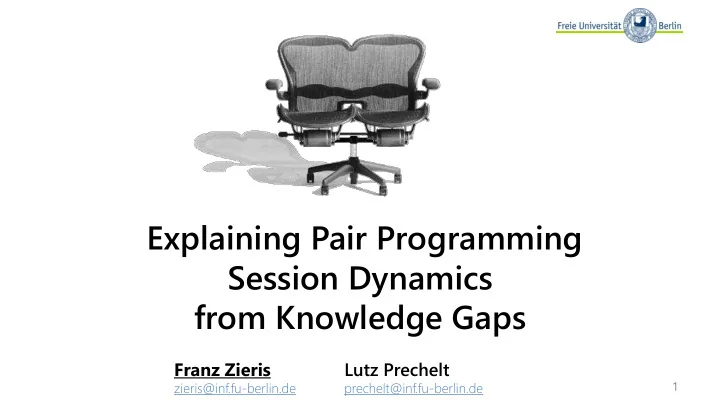

Explaining Pair Programming Session Dynamics from Knowledge Gaps Franz Zieris Lutz Prechelt 1 zieris@inf.fu-berlin.de prechelt@inf.fu-berlin.de
Motivation • Expectations in industry: • Our Overall Research Goal Why pair-program? – Understand how industrial pair programming actually works Better design and fewer defects • Research Question What are the underlying mechanisms of knowledge transfer Learn from each other or together in pair programming? Understand legacy parts of the • Intended Outcome software system – Advise practitioners – behavioral (anti-)patterns 2
Qualitative Data Analysis • Grounded Theory approach • Recorded industrial PP sessions (audio, webcam, screen) = 39.5 hours total Theoretical sampling: 26 sessions (9 companies, 16 pairs) • from a total of 67 sessions 3
Qualitative Data Analysis Rly? ? 26 pairings of professional developers ! OK Ah! … Analysis of pair programmers' dialog: • What do they ask for? What do they explain? • What do they know? What do they learn? 4
Observation 1: The Primary Gap One partner already worked on the task 5
Observation 1: The Primary Gap One partner already worked on the task Primary Gap I'll show you what I did. OK = task-relevant system knowledge current state of implementation, classes, call hierarchies, defects, test/build setup, configuration state , … 6
What about more homogenous pairs? Both partners with similar One partner already worked on the task prior involvement = task-relevant system knowledge 7
What about more homogenous pairs? Both partners with similar One partner already worked on the task prior involvement recently worked in code area basic knowledge of software working in unknown terrain = task-relevant system knowledge 8
Observation 2: The Secondary Gap Both partners with similar prior involvement Secondary Gap recently worked Let's look at the superclass in code area basic knowledge of software console.log(myObj); working in unknown terrain = task-relevant system knowledge 9
Observation 2: The Secondary Gap Both partners with similar prior involvement Good system Acquiring System understanding Knowledge together works for most pairs Medium system understanding Little system … but not for all understanding = task-relevant system knowledge 10
A Different Kind of Knowledge Task: implement test case S knowledge (task-relevant system understanding) Data structure holding the application state? How to modify and read the state? … Where is the initial value? G knowledge (task-relevant general software development knowledge) Type? Function? I don't even know Syntax of programming language? what this is. Higher-order functions? Application framework? Test framework? … 11
Roles of S and G knowledge In general: S needs must be addressed for productive work S: Task-relevant System Knowledge (e.g., not knowing some test feature) Small G need: not problematic Large G need: problematic (e.g., not knowing the test framework) G: Task-relevant General Software 12 Development Knowledge
The G Opportunity Do you know the Template Method pattern? S: Task-relevant System G Opportunity seized Knowledge G Opportunity not seized Why did she do that? G Opportunity (e.g., knowing more about design patterns) G: Task-relevant General Software 13 Development Knowledge
Overall Session Dynamic S 26 pairings of professional developers Overall Dynamic 1. Close Primary Gap 2. Close Secondary Gap 3. Seize G Opportunity G 14
Overall Session Dynamic S 26 pairings of professional developers Overall Dynamic 1. Close Primary Gap 2. Close Secondary Gap 3. Seize G Opportunity G 15
Overall Session Dynamic S 26 pairings of professional developers Overall Dynamic 1. Close Primary Gap 2. Close Secondary Gap 3. Seize G Opportunity G 16
Overall Session Dynamic S 26 pairings of professional developers Overall Dynamic 1. Close Primary Gap 2. Close Secondary Gap 3. Seize G Opportunity G 17
Summary • A lack of and differences in S system understanding are more important than differences in general programming experience • What matters is task- relevant knowledge → different knowledge needs, different session dynamic G 18
Summary • A lack of and differences in S system understanding are more important than differences in general programming experience • What matters is task- relevant knowledge → different knowledge needs, different session dynamic • Mutually satisfactory constellation: Complementary Gaps G 19
Summary S • A lack of and differences in system understanding are preprint more important than differences in general G programming experience • What matters is task- relevant knowledge → different knowledge needs, different session dynamic http://inf.fu-berlin.de/inst/ag-se/ pubs/ZiePre20-ppsessiondyn.pdf • Mutually satisfactory constellation: Complementary Gaps 20
Images https://web.archive.org/web/20080509191418/http://www.cenqua.com/pairon/ Icon "design" by Adrien Coquet from the Noun Project Icon "Bug" by Minh Do from the Noun Project Icon "knowledge" by Olivia from the Noun Project Icon "Box" by No More Heroes from the Noun Project Icon "corner webs" by Kate Maldjian from the Noun Project Icon "Computer" by Denis Shumaylov from the Noun Project 21
Recommend
More recommend